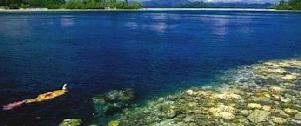|
HONIARA, Solomon Islands, December 8, 2000 (ENS) - The first shipment of Solomon Islands eco-timber to Australia has just reached Sydney. Solomon Islands villagers have successfully been producing and marketing eco-timber for the last three years. The eco-timber is managed in a way which causes minimal damage to the forests. The shipment to Sydney comes mainly from the beautiful Marovo Lagoon area in the western Solomon Islands. In a country torn by a tribal conflict, with nearly 100 people dead and the economy in tatters, the Solomon Islands eco-timber industry emerges as a much needed enterprise to help regain social and economic stability. "This shipment is an amazing success for the village eco-timber producers and for the program, especially given the civil war in the Solomon Islands over the last year and half," said Greenpeace forests campaigner, Grant Rosoman. The Solomon Islands Eco-forestry Project is a joint initiative of Greenpeace, the Solomon Islands Development Trust, Foundation for the People of the South Pacific and the New Zealand Imported Tropical Timber Group. The project empowers the local communities by helping them manage, maintain and market their own natural resources in sustainable ways while protecting their own environment and culture. Through the project Solomon Islands village communities have been working for several years towards finding an income generating project that conserves their forests and marine resources. Since 1995 the program has been helping village communities to organize themselves, manage their forests sustainably, and then mill and market a product they can now call eco-timber. The Solomon Islands villagers have been exporting eco-timber since 1997. Over 1,000 cubic meters of the timber has been produced in the last three years, a third of it exported to New Zealand. Now, the villagers have now sent their first shipment of Solomon Islands Eco-timber to Australia. Seven years ago, at the request of indigenous forest owners who were facing the threat of industrial logging, Greenpeace, along with a local community organization Solomon Islands Development Trust (SIDT) and other local and regional partners, established the Eco-forestry Programme. Since the 1980s, Australian and Asian logging companies have swept through the Solomon Islands, leaving a trail of disintegrating communities, flattened and degraded forests and silted coral reefs from runoff of exposed fragile soils. This industrial scale logging is creating environment disasters such as soil erosion and siltation that is drastically affecting the bird, animal and marine life of the Pacific Ocean. Thousands of hectares are destructively logged every year. Over the last decade, the rate of logging has been more than three times the sustainable level - the productive forests are being cut three times faster than they are growing. The foreign owned destructive logging and log export trade is part of the current political destabilization in the islands, where corruption and individual greed undermines good governance and accountability. Despite the upheaval, the Solomon Islands Eco-forestry Programme has been able to continue training and supporting people in eco-forestry practices and marketing their special timber. "Destructive logging was threatening their forests but these communities instead chose a sustainable income and forest protection. It's also a lot of hard work, so we are especially proud in helping them to begin exporting to Australia," said Felix Narasia, Solomon Islands Development Trust eco-forestry coordinator. Marovo Lagoon in Western Province, Solomon Islands was chosen because of threats from logging, mining and forest clearance for a palm oil plantation in what is one of the Earth's natural wonders and a proposed World Heritage Area. Marovo people have cared for their resources for generations, and are looking for a way to generate income that conserves their forests and marine resources. Greenpeace funded a study by a resource economist, comparing the economic costs and benefits of industrial logging to those of a small scale development. The report found that the cash value to local communities of small scale options, such as eco-forestry, fishing, tourism, carving and other crafts, food and building materials, was at least three times more than the destructive industrial options. Small scale options give landowners more direct control of their resources, distribute benefits more fairly and do not expose them to the high risk of fluctuations in international commodity markets. The report recommended no logging or palm oil plantations should be permitted in the Marovo area. Eco-forestry involves villagers harvesting and milling trees and carrying the resulting "Eco-timber" out of their forest with minimal damage to the surrounding forest. Community-based planning and control, and strict guidelines that are externally monitored, ensure the forest is restored quickly to its original state. Industrial logging, by contrast, cuts down all economically useful trees in a forest. This means the area can take decades or longer to recover and the landowners lose many other things of value from the forests such as food and medicines. Eco-timber is a community forestry category of certified timber. It can be used for joinery, flooring, decking, paneling and furniture. The Eco-forestry Programme expects to receive the The Forest Stewardship Council's certification eco-label next year. The Forest Stewardship Council (FSC) is viewed by many as the most successful and credible wood product certification and labeling scheme. FSC certification is the only international certification scheme that has the widespread support of non-government organizations. The FSC oversees the independent and voluntary assessments of forest management to high environmental, social and economic standards. Currently, there are over 18 million hectares (69,480 square miles) of FSC certified forests in 33 countries. Global demand for FSC products is estimated to be in excess of A$50 billion ($US27.32 billion). Destructive logging across the island nations of the Pacific is still causing disintegration of cultural ways of life. Under industrial scale logging, the local people across the Pacific have experienced reduced control over their own natural resources. The Solomon Islands' eco-timber success story is a beacon to the rest of the Pacific Island nations to manage their forests sustainably now before the Pacific loses its unique cultural and natural resources.
|

